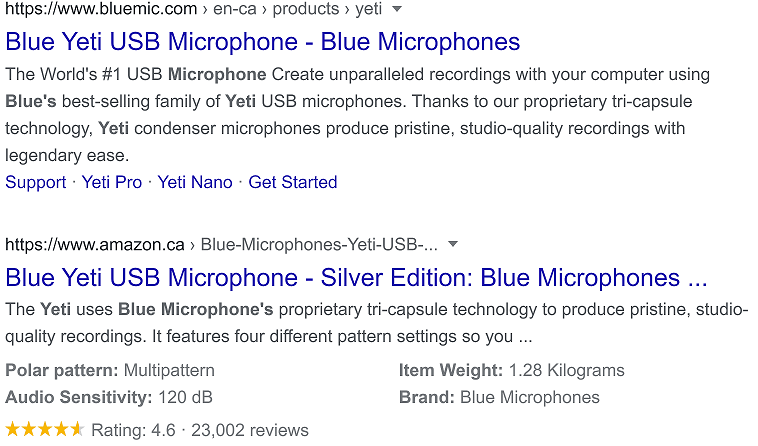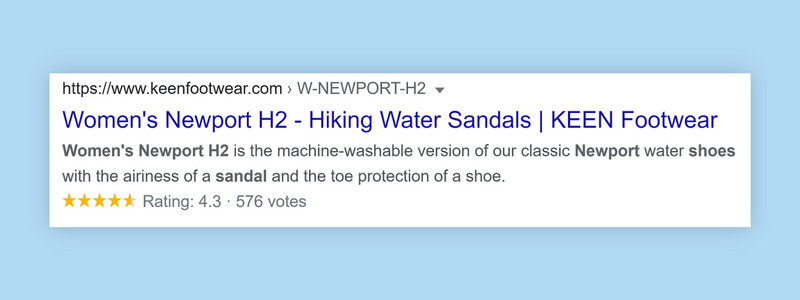The eCommerce industry is growing fast, but so are acquisition costs. As a result, many brands are focusing on organic traffic.
There are benefits to having both paid and organic traffic for your brand, including the opportunity to show up more than once on a search engine results page (SERP). Yet focusing solely on paid advertising doesn’t cut it anymore. Up to 80% of users focus exclusively on organic search results and ignore paid ads altogether.
While everyone is investing in SEO strategies, an effective—and often overlooked—advanced SEO approach is schema markup.
Schema Markup (also known as structured data) is a language created by Microsoft, Yahoo!, Google and Yandex to help search engines understand the content on your website. By marking up products on your eCommerce website, your content could be eligible for rich results in search. However, to achieve rich results, your content needs to be marked up correctly.
Take a look at how schema markup can make your brand stand out in search.
Product Schema Markup
Shoppers are getting smarter, and search engines are always evolving to find new ways to match user intent to results in search.
Rich results can make your product information more eye-catching so that you don’t even need to be at the top of a SERP to stand out. Marking up your product pages can even provide additional information in Google images.
You may already be familiar with product and review rich results, which help your customers to see the price, availability and customer reviews and ratings of your products right on the SERP. Look at the difference between these two search results for a Blue Yeti Microphone. The Amazon result really stands out even though it was below the blue result on the page.

Here are the essential product markup properties that we recommend:
- Price
- Product Name
- Product Description
- High-Resolution Product Images
- Availability
- Brand
- Reviews
- Breadcrumbs
To be eligible for product rich results in search, Google recommends marking up individual product pages instead of a category or list of products. Read more about Google’s guidelines for product schema markup here.
Not only will marking up your product information make your page eligible for a rich result on the SERP, it also displays the information in Google Images.
Since September 2020, Google has been evolving the product search engine page results, showing types of pricing and illustrating pricing changes. Google requested new pricing properties in Schema.Org and we expect these properties to be included as recommended properties for products in the future.
Review Snippets for eCommerce Websites
Let your customers speak for you by encouraging them to leave reviews. Then take these reviews even further with schema markup.
Online reviews are seeing a rise in consumer trust. 97% of consumers are influenced by reviews when making a purchase, and customer reviews can increase conversions by up to 270%. In an age where information is so readily available online, it’s important to put your brand in front of readers with as much clarity and credibility as possible.
You don’t need thousands of reviews to make an impact. In fact, BrightLocal’s 2020 local consumer survey revealed that consumers look for an average of 10 customer reviews before trusting a star rating. And that star rating? Only 48% of consumers would use a business with a rating under 4 stars.
After receiving excellent reviews from your customers, showcase them in search by marking up your website. Adding review structured data to your web pages can make your content eligible for the Review Snippet rich result.

If Google finds a valid review or rating markup, your content could display a short excerpt of the reviews and an aggregate star rating in search.
Reviews demonstrate to search engines like Google and other consumers that you have a great product or service. Investing in your brand’s credibility will be rewarded time and time again.
Schema Markup and the Customer Journey
Schema markup can have a positive impact across the customer journey, from the research phase to converting a sale. Online spending in the United States was over 21% of total retail sales in 2020, up 44% from the year before. With the pandemic and global lockdowns forcing more people to shop from home, this isn’t all that surprising. Changing consumer habits reshape marketing funnels, and a user could interact with your brand at various stages of their customer journey.
There are three basic types of search intent:
- Informational – the intent is to answer a question or to learn something
- Navigational – the intent is to locate a specific website
- Transactional – the intent is to buy something
Transactional search intent usually leads to higher eCommerce conversion rates since the buyer has already decided to make their purchase. But there are opportunities to capture a user’s attention through other types of search intent as well.
If your product is marked up properly, this information can be eligible for rich results to improve visibility in search. You want your product or service to be suitably matched to a consumer’s needs, and this is what search engines seek to accomplish as well.
Technical SEO Best Practices for eCommerce Websites
You may be asking yourself, why can’t search engines determine important product information themselves without our help?
Search engines are becoming increasingly intelligent and can continuously crawl website content. However, Google alone can’t extract all the essential details from product pages. To bridge this gap, we can assist Google by providing key information through structured data, product feeds, or Google Merchant Center. This not only helps Google identify crucial details within your content but also enables it to better contextualize and deeply understand your content. As a result, Google can align your pages with more relevant queries, improving the quality of traffic to your site.
The reality is, Google won’t display product information as enhanced search results unless it’s confident about the product information it’s presenting.
This is similar to the concept of E-E-A-T, which stands for Experience, Expertise, Authoritativeness and Trustworthiness. E-E-A-T has become a core concept for advanced SEO, and is essential to improving a brand’s search rankings. For both rich results and E-E-A-T, Google needs to be confident in your brand and the information that you’re publishing. The more information that you can supply to search engines, the more confident they will be displaying your brand in search results.
Set Your eCommerce Brand Up For Success
These strategies will help to set up your e-commerce brand for success, but the investment doesn’t stop there. To remain relevant in an ever-changing digital market, it’s important to keep informed on the trends in advanced SEO. Sign up for our newsletter to stay updated, or get in touch with us if you want to help your products stand out in search.
Frequently Asked Questions
What are the best rich results for eCommerce websites?
You may already be familiar with the Product rich result, which can display the name, price, availability, etc., of your e-commerce products in search. There are many other rich result opportunities for e-commerce websites, such as frequently asked questions (FAQs), HowTo, Videos, and more! See our Guide to E-commerce Structured Data to learn more.
How do I get stars and ratings on my products in search?
The stars and ratings that you see on products in search results come from Product schema markup. To unlock this rich result in search, follow Google’s structured data guidelines, including all required and any recommended properties that will make your rich result more robust in search.
We help you think beyond the product rich result and strategize with you to stay ahead of the competition. We’ve helped some of the biggest e-commerce brands, including Keen Footwear, Home Hardware, and Ariat, become leaders in the online shopping industry by setting new standards above the existing baseline.
Learn more about how to start marking up your ecommerce website.

